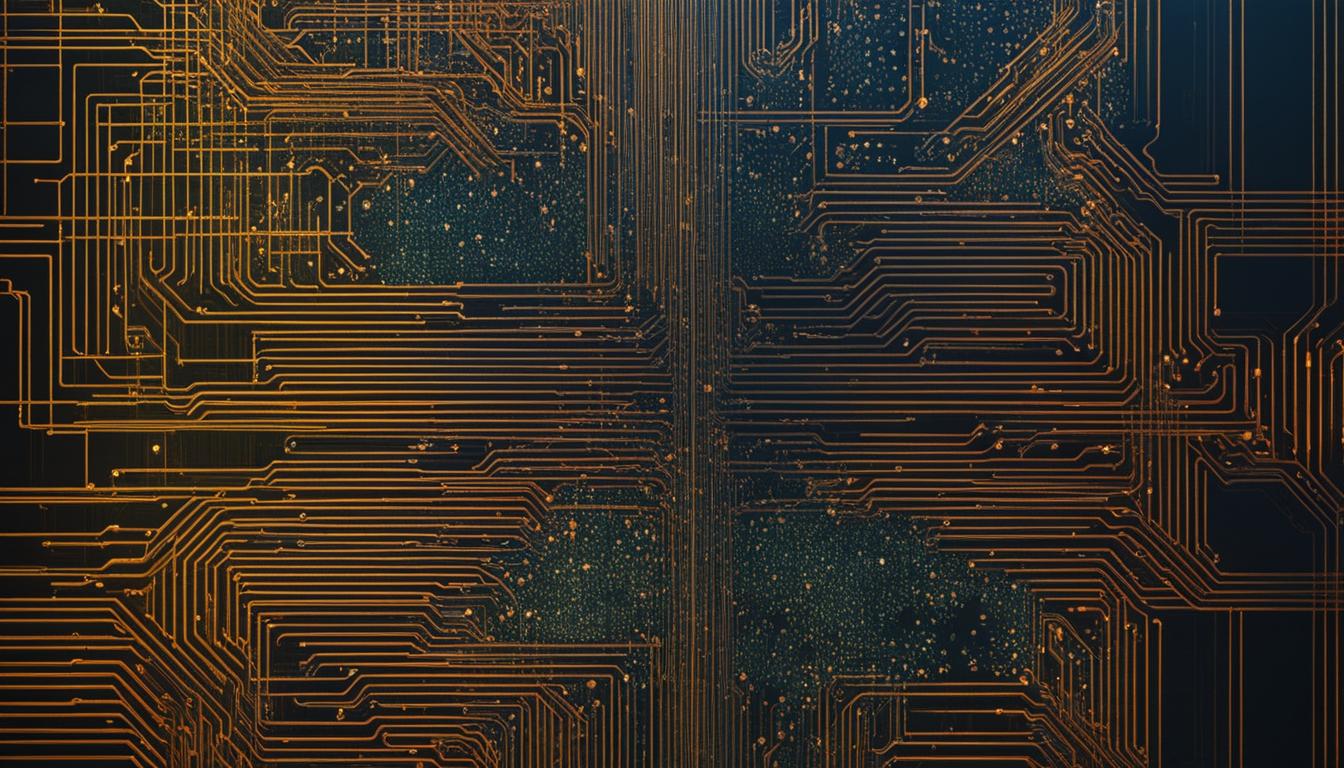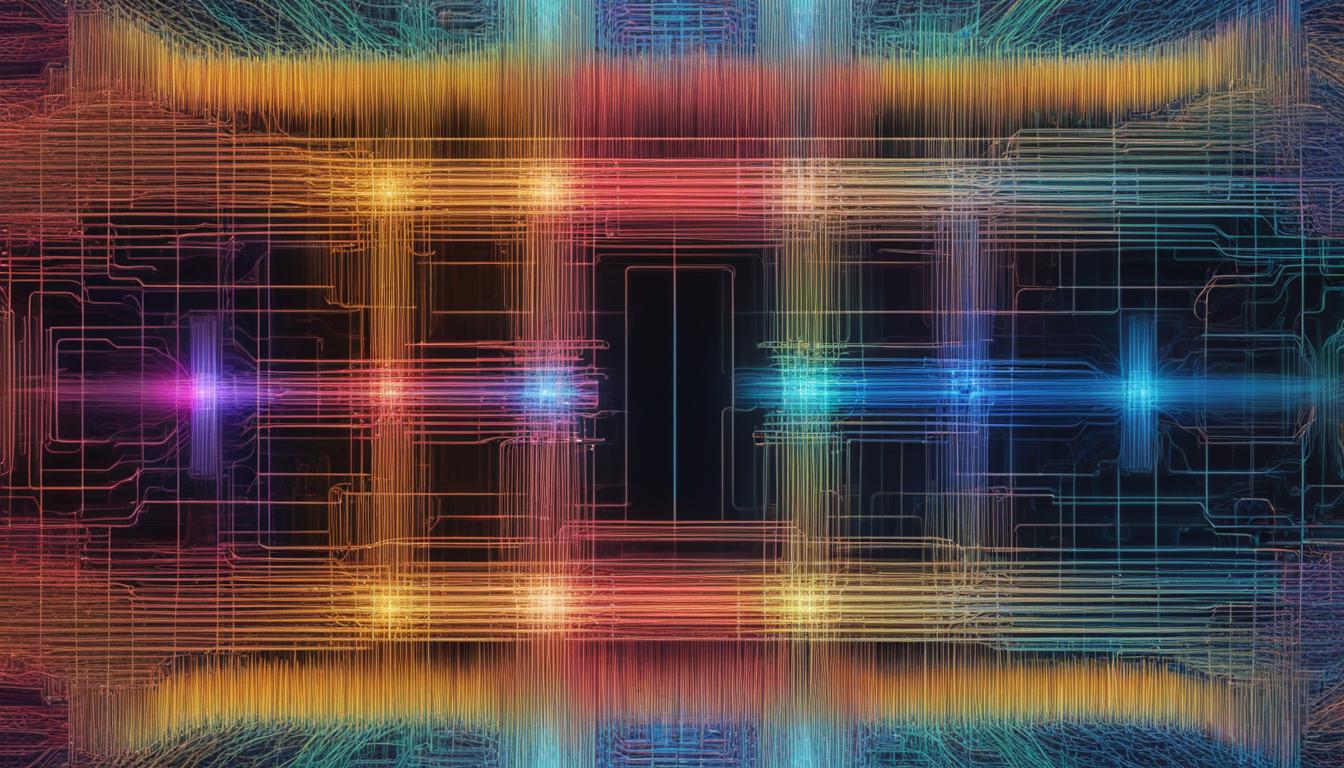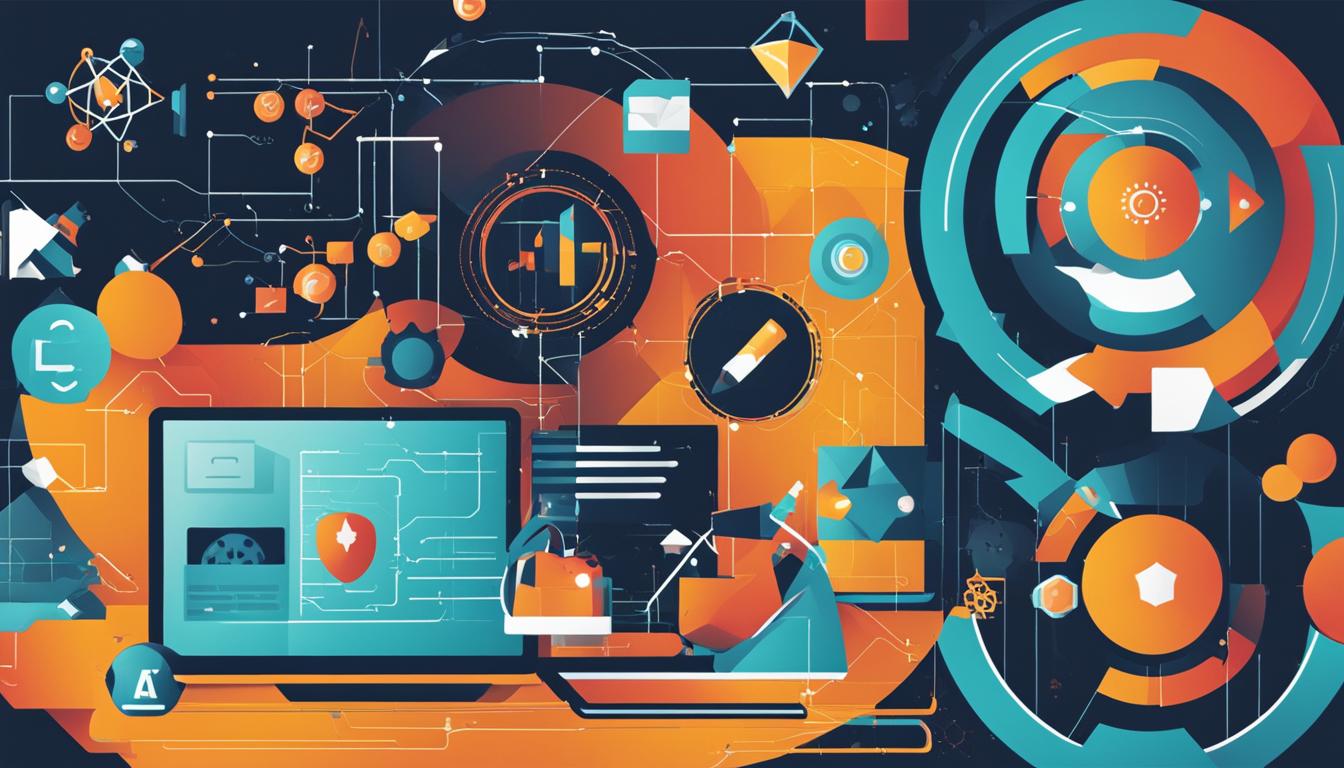Artificial Intelligence (AI) and natural intelligence (human intelligence) are two distinct forms of intelligence that have their own characteristics and capabilities. Understanding the differences between AI and natural intelligence is essential in comprehending the advancements and limitations of both.
AI is developed to replicate human cognitive abilities, including learning, problem-solving, reasoning, and perception. It encompasses various tasks such as robotics, control systems, face recognition, scheduling, and data mining. On the other hand, natural intelligence is the intelligence exhibited by humans, which is shaped by past experiences, knowledge, and the ability to adapt to different situations.
While AI possesses the advantage of processing large amounts of data quickly and working without breaks, it lacks the creativity, intuition, and ethical considerations inherent in human intelligence. Natural intelligence, on the other hand, excels in adaptability, creativity, and making complex judgments based on emotions and contextual factors.
Key Takeaways:
- AI aims to replicate human cognitive abilities, while natural intelligence is exhibited by humans.
- AI can process data quickly and work without breaks, but lacks creativity and intuition.
- Natural intelligence is adaptable, creative, and capable of making complex judgments based on emotions and context.
- AI and natural intelligence have their own strengths and limitations.
- The integration and collaboration of AI and human intelligence will shape the future of innovation and progress in various fields.
Advantages of Artificial Intelligence (AI)
Artificial Intelligence (AI) offers numerous advantages in various domains, making it a valuable tool in today’s technological landscape. Here are some key advantages of AI:
- Efficiency and Speed: AI can process vast amounts of data at incredible speed, surpassing human capabilities. This enables AI systems to analyze complex information and make informed decisions in a fraction of the time it would take a human.
- Precision and Accuracy: AI systems are highly accurate and reliable when programmed and trained correctly. They can perform repetitive tasks with utmost precision, minimizing human errors and improving overall quality and consistency.
- Continuous Operation: Unlike humans who require rest and breaks, AI systems can work continuously without fatigue or the need for downtime. This allows for uninterrupted operations, increasing efficiency and productivity.
- Handling Complexity: AI excels in handling complex, data-intensive tasks that would be overwhelming or impossible for humans to manage effectively. From intricate data analysis to intricate algorithms, AI can handle intricate processes with ease.
These advantages make AI a powerful tool across various industries, including healthcare, finance, manufacturing, and transportation. By harnessing the potential of AI, organizations can streamline processes, improve decision-making, and drive innovation.
| Industry | Application |
|---|---|
| Healthcare | Diagnosis and treatment recommendation systems |
| Finance | Fraud detection and risk assessment |
| Manufacturing | Quality control and optimization |
| Transportation | Autonomous vehicles and predictive maintenance |
As AI continues to advance, its potential to revolutionize industries and improve human lives is immense. However, it is crucial to consider the ethical implications and ensure responsible AI development and deployment. By harnessing the advantages of AI while addressing its limitations, we can pave the way for a future where humans and machines collaborate to achieve remarkable feats.
Disadvantages of Artificial Intelligence (AI)
While artificial intelligence (AI) has numerous advantages, it also comes with its fair share of disadvantages. One major drawback is the lack of creativity and intuition that AI exhibits. Unlike human intelligence, which can think outside the box and make judgments based on gut feelings, AI is limited by its programming and may struggle to adapt to new or unexpected situations.
Another disadvantage of AI is the potential for errors if it is not properly programmed and trained. AI systems heavily rely on data and instructions they receive, and any inaccuracies or biases in that data can lead to flawed decision-making. Additionally, AI may not possess the same level of ethical considerations as human intelligence, raising concerns about the potential impact on society and human well-being.

Furthermore, AI lacks the human ability to understand and empathize with others. While AI can replicate certain aspects of human behavior and communication, it lacks the emotional intelligence that allows humans to connect on a deeper level. This limitation can have implications in various domains, such as customer service or healthcare, where human empathy and understanding are vital.
| Disadvantages of Artificial Intelligence (AI) |
|---|
| Lack of creativity and intuition |
| Potential for errors if not properly programmed and trained |
| Lack of ethical considerations |
| Lack of emotional intelligence |
While AI continues to advance and evolve, it is important to recognize its limitations and potential drawbacks. By understanding the disadvantages of AI, we can better utilize this technology and find ways to address its shortcomings. Ultimately, a balanced approach that combines the strengths of both AI and human intelligence is likely to lead to the most effective and beneficial applications of artificial intelligence.
Advantages of Human Intelligence
Human intelligence possesses unique qualities that set it apart from artificial intelligence (AI). These advantages highlight the capabilities and strengths of human cognitive abilities, which cannot be fully replicated by AI technologies. Understanding the advantages of human intelligence is crucial in appreciating the value that humans bring to various domains and fields.
1. Creativity and Innovation
One of the key advantages of human intelligence is creativity. Humans have the ability to think outside the box, generate novel ideas, and approach problems from unique perspectives. Unlike AI, which relies on pre-programmed algorithms and data, human intelligence can come up with innovative solutions and make creative choices that may not be easily deduced from existing information or patterns. This advantage enables humans to drive innovation, conceptualize new concepts, and push the boundaries of knowledge and imagination.
2. Emotional Intelligence and Empathy
Emotional intelligence is another significant advantage of human intelligence. Humans possess the ability to understand and empathize with others, recognizing and interpreting emotions through facial expressions, body language, and tone of voice. This nuanced understanding of human emotions allows for effective communication, building meaningful relationships, and responding appropriately to the needs and feelings of others. Empathy, a core aspect of emotional intelligence, plays a vital role in areas such as counseling, leadership, and interpersonal interactions, where human connection and understanding are essential.
3. Adaptability and Complex Problem-Solving
Human intelligence excels in adaptability and complex problem-solving. Humans can quickly adapt to new and unexpected situations, drawing upon past experiences, knowledge, and intuition to navigate challenges and make informed decisions. Unlike AI, which often requires pre-programming and training specific to a given task, human intelligence can understand and analyze complex problems, considering various factors and perspectives to arrive at comprehensive solutions. This flexibility enables humans to tackle complex, dynamic, and ambiguous situations that may require a multifaceted approach.
| Advantages of Human Intelligence |
|---|
| 1. Creativity and Innovation |
| 2. Emotional Intelligence and Empathy |
| 3. Adaptability and Complex Problem-Solving |
As shown in the table above, human intelligence brings unique advantages that are essential in various domains. The combination of creativity, emotional intelligence, and adaptability allows humans to excel in areas that require flexibility, innovation, and understanding. While AI has its strengths, the advantages of human intelligence highlight the irreplaceable contributions that humans can make in solving complex problems, fostering interpersonal connections, and driving meaningful progress in society.
Overall, the advantages of human intelligence lie in its ability to think creatively, empathize with others, and adapt to diverse situations. These qualities enable humans to bring a human touch to areas that require emotional understanding, complex problem-solving, and innovative thinking. While AI may continue to advance and complement human intelligence in various fields, it is crucial to acknowledge and harness the unique strengths that human intelligence possesses.
Disadvantages of Human Intelligence
While human intelligence possesses remarkable qualities, it also has its limitations. Understanding these disadvantages can provide valuable insights into the unique challenges and considerations associated with human cognitive abilities.
1. Subjectivity and Bias
Human intelligence is prone to subjectivity and bias, which can impact decision-making and problem-solving. Personal beliefs, emotions, and cultural influences can introduce biases that hinder objective analysis and decision-making. This subjectivity can lead to errors in judgment, preventing humans from approaching problems with an entirely unbiased perspective.
2. Physical and Mental Limitations
Humans have physical and mental limitations that can impede cognitive processes. Unlike AI, which can work continuously without breaks, humans require rest and downtime. These physical limitations can slow down processes and affect productivity. Additionally, humans have limited memory capacity and processing power compared to AI, which can affect the speed and accuracy of information recall and processing.
3. Inability to Scale
Human intelligence is limited by its inability to scale like AI. While humans can learn and improve over time, their ability to process and analyze vast amounts of data is relatively constrained. This limitation prevents humans from efficiently handling complex tasks that require extensive data analysis and decision-making. In contrast, AI systems excel at processing large volumes of data quickly and can outperform humans in certain specialized tasks.
| Disadvantages of Human Intelligence | Description |
|---|---|
| Subjectivity and Bias | Human intelligence is prone to subjective biases that can impact decision-making. |
| Physical and Mental Limitations | Humans have physical and mental limitations that can slow down processes and affect productivity. |
| Inability to Scale | Human intelligence is limited in its ability to efficiently process large volumes of data. |
Despite these disadvantages, human intelligence remains invaluable in areas that require creativity, intuition, and emotional intelligence. Understanding the limitations of human intelligence can help guide the development and integration of AI systems, leveraging their strengths and compensating for their shortcomings to create a harmonious collaboration between human and artificial intelligence.

Similarities between AI and Human Intelligence
While AI and human intelligence may seem fundamentally different, they do share some intriguing similarities. These parallels highlight the interconnectedness between machines and humans in the realm of intelligence. Understanding the similarities can provide valuable insights into the potential of AI and its role alongside human intelligence.
One notable similarity between AI and human intelligence is their capacity to learn and improve over time. AI algorithms can be trained on vast amounts of data, allowing them to recognize patterns and make informed decisions based on acquired knowledge. Similarly, humans have the ability to learn from their experiences, gather information, and adapt their behavior accordingly.
Learning and Problem-Solving
Both AI and human intelligence excel in learning and problem-solving. AI algorithms can process vast amounts of data quickly, identifying complex patterns and correlations that humans might overlook. Similarly, humans possess cognitive abilities that enable them to recognize patterns, solve intricate problems, and generate innovative solutions.
Another similarity lies in the use of information from the world around them. Both AI and human intelligence utilize external data to inform their decision-making processes. AI algorithms rely on input data to make predictions and recommendations, while humans draw on their experiences and observations to make judgments and form opinions.
Decision-Making and Adaptability
AI and human intelligence also share similarities in their decision-making processes. AI algorithms can make decisions based on predefined rules and objectives, just as humans make decisions by weighing various factors and considering the context. Additionally, both AI and human intelligence possess the ability to adapt their behavior to new situations, enabling them to navigate unfamiliar territory and respond effectively to changing circumstances.
While the similarities between AI and human intelligence are undeniable, it is important to recognize that the mechanisms and processes through which they operate are fundamentally different. While AI relies on algorithms and mathematical models, human intelligence is rooted in complex cognitive processes and biological structures. Understanding and leveraging these differences can lead to innovative applications and advancements in both AI and human intelligence.
| Similarities between AI and Human Intelligence |
|---|
| Learning and Improvement over time |
| Utilization of information from the world |
| Learning and Problem-Solving abilities |
| Decision-Making and Adaptability |
Differences between AI and Human Intelligence
AI and human intelligence are fundamentally different in terms of their underlying principles and capabilities. AI relies on algorithms and mathematical models to process data and perform specific tasks, while human intelligence is based on cognitive processes, memory, and complex biological structures. Here are some key differences between AI and human intelligence:
Processing Speed
AI excels in processing large amounts of data quickly and efficiently. It can analyze complex information and make decisions at a much faster pace than humans. This speed advantage enables AI to perform tasks that would take humans significantly longer to accomplish.
Adaptability and Contextual Understanding
Human intelligence possesses the unique ability to adapt to new and unexpected situations. It can learn from experience, apply prior knowledge to new contexts, and make complex judgments based on emotions and contextual factors. AI, on the other hand, relies on predefined algorithms and lacks the ability to adapt and understand context in the same way humans do.
Creativity and Intuition
One of the defining characteristics of human intelligence is its creativity and intuition. Humans can think outside the box, come up with innovative solutions to problems, and make judgments based on gut feelings. AI, however, lacks this creative and intuitive capacity, as it operates based on predetermined patterns and algorithms.
While AI and human intelligence have their own strengths and limitations, they play complementary roles in various fields. The integration and collaboration between AI and human intelligence are expected to continue shaping the future, with each contributing its unique capabilities to drive innovation and progress.
| Differences | AI | Human Intelligence |
|---|---|---|
| Processing Speed | Faster than humans | Relatively slower |
| Adaptability | Limited ability to adapt to new situations | Can adapt and learn from experience |
| Creativity and Intuition | Does not possess creativity and intuition | Capable of creative thinking and intuition |
Conclusion
In contrast to natural intelligence, AI represents a unique realm of cognitive abilities. AI excels in processing data at an unprecedented rate and executing specific tasks with precision. However, it falls short in areas such as creativity, intuition, and ethical considerations that are inherent in human intelligence.
The human brain possesses remarkable adaptability, creative thinking, and the capacity to make complex judgments based on emotions and contextual factors. This contrast between AI and the human brain highlights the unique strengths of both systems.
Moving forward, it is foreseeable that AI and human intelligence will continue to integrate and collaborate, leveraging their respective strengths to drive innovation and progress. While AI can enhance efficiency and accuracy in various fields, human intelligence offers a dynamic approach, enabling us to navigate uncharted territories, learn from experiences, and make context-based decisions.
The distinction between AI and human cognitive abilities, such as AI vs. the human mind, underscores the fact that they operate through different mechanisms and processes. The future will likely witness the coexistence and harmonious interaction of AI and natural intelligence, shaping a world where the boundaries of what is possible continue to expand.
FAQ
What is Artificial Intelligence (AI)?
Artificial Intelligence (AI) is based on human insights and aims to replicate human cognitive abilities such as learning, problem-solving, reasoning, and perception. It covers a wide range of tasks, including robotics, control systems, face recognition, scheduling, and data mining.
What is natural intelligence?
Natural intelligence is the intelligence exhibited by humans, which is based on past experiences, knowledge, and the ability to adapt to different situations.
What are the advantages of AI?
AI can process vast amounts of data quickly, work continuously without breaks, and perform tasks that are dangerous or difficult for humans.
What are the limitations of AI?
AI lacks creativity, intuition, and may make errors if not programmed and trained properly.
What are the advantages of human intelligence?
Human intelligence possesses creativity, intuition, emotional intelligence, adaptability, and the ability to make judgments based on gut feelings.
What are the limitations of human intelligence?
Human intelligence is limited by physical and mental capabilities, requiring rest and breaks, and can be influenced by biases and errors in judgment.
What are the similarities between AI and human intelligence?
Both AI and human intelligence have the ability to learn and improve over time, solve complex problems, and make decisions based on information.
What are the differences between AI and human intelligence?
AI is based on algorithms and mathematical models, while human intelligence is based on cognitive processes and biological structures. AI relies on data and instructions, whereas human intelligence uses memory, processing power, and cognitive abilities. AI can process data and perform tasks faster, but humans possess adaptability and contextual decision-making.



